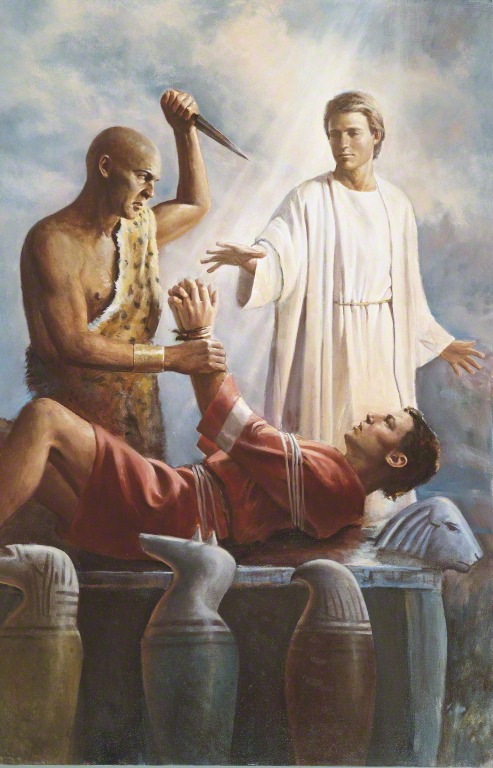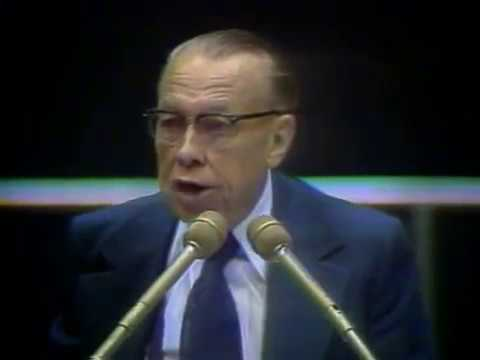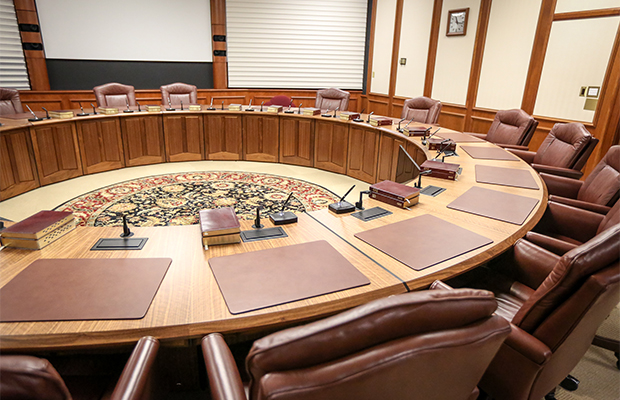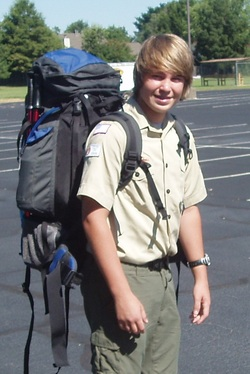The Problem
In some cases, Latter-day Saint sacrament meetings start with a fraction of those who will eventually show up. At least those who come in late are spared the spectacle of young men putting the cloth on the sacrament table after the meeting has started. For some, tardiness has become a way of life. We joke about “Mormon Standard Time” as if it were something to be tolerated. (I once heard a rabbi refer to “Jewish Standard Time,” so we obviously we aren’t alone.) Many are late to meetings, late with reports, and late in paying their tithing. When home teaching was still part of the Church, some home teachers notoriously visited on the last day of the month, if at all.

What difference does it make?
In the Church, our promptness with reports and punctuality in attendance and other obligations are marks of our love of the Lord and the seriousness with which we view his work. It is surely part of “magnifying” our calling, which is one of the prerequisites to our receiving all that our Father has. (D&C 84:33-39.) The Lord takes it personally when we are late to appointments with his authorized representatives. “He that receiveth my servants receiveth me.” Sacrament meeting would be one such appointment.
The Spirit of the Lord is felt most readily in an atmosphere of peace, calm, and quiet. It is a “still, small voice.” If we arrive at Church hurried and anxious, we may well not hear it at all. And by the confusion we create as we come in late, we may interfere with others’ hearing it as well. There is an entirely different feeling present when one arrives at a meeting ten to twenty minutes early, has time to find a seat near the front, and has time to listen to the prelude music and meditate prior to the start of the meeting.

Furthermore, in Malachi 3:8 the Lord asks, “Will a man rob God?” He goes on to explain that people were then robbing him in “tithes and offerings.” He might tell some of us today that we rob him and his children by our lack of punctuality. If we were going to a job interview with a prospective employer, wouldn’t we be on time? Why not be even more concerned about what the Lord thinks of us? As the Lord said in Isaiah 51:12-13: “Who art thou, that thou shouldest be afraid of a man that shall die, and of the son of man which shall be made as grass; And forgettest the LORD thy maker …?”
In the temple, occasionally patrons arrive two or three minutes before the start of a session and expect that those in charge will delay the start of the session until they are dressed and ready. Few stop to calculate that if they hold up the session for five minutes, and if there are thirty others in the session, the latecomer will have robbed the others of a total of two and a half hours! Naturally, it is better to let the late brother wait an hour and a half or two hours until the next session rather than make those who arrived on time pay the price for his tardiness.

Can we imagine the Savior being late to an appointment? (Mary and Martha thought He was late in coming to heal Lazarus, but he purposely waited until after Lazarus’ death in order to teach a lesson.) What if the angel had been late who was sent to keep Abraham from slaying Isaac? Or the angel sent to loosen Abraham’s bonds at the very moment the Chaldean priests were ready to take away his life? Or if the seagulls had come two weeks later than they did in response to the pioneers’ prayers?

The Lord has emphasized the value of doing things promptly: “He that seeketh me early shall find me, and shall not be forsaken.” (D&C 88:83.) [We are unaware of any encouraging promise to those who seek him late.] D&C 88:124 likewise says: “Cease to be idle; cease to be unclean; cease to find fault one with another; cease to sleep longer than is needful; retire to thy bed early, that ye may not be weary; arise early, that your bodies and your minds may be invigorated.”
Scriptural examples of prophetic punctuality
The scriptures are full of examples of prophets and other faithful saints who cared enough to do their assigned tasks “early.” See for example:
- Abraham “rose up early in the morning” to begin the journey to sacrifice Isaac. (Gen. 22:3.)
- Following his inspired dream of the Lord and heaven, “Jacob rose up early in the morning.” (Gen. 28:18.)
- Prior to the exodus, the Lord told Moses, “Rise up early in the morning, and stand before Pharaoh.” (Ex. 8:20.)
- After his experiences on Sinai, “Moses wrote all the words of the Lord, and rose up early in the morning, and builded an altar under the hill, and twelve pillars, according to the twelve tribes of Israel.” (Ex. 24:4.)
- When Moses prepared to return to Sinai for a replacement of the broken tablets, he “rose up early in the morning, and went up unto mount Sinai.” (Ex. 34:4.)
- “Joshua rose early in the morning, and the priests took up the ark of the Lord” to circle the city of Jericho for six days, “And it came to pass on the seventh day, that they rose early about the dawning of the day, and compassed the city after the same manner” on the day when the Lord delivered Jericho into their hands. (Joshua 6:12, 15)
- Gideon and his people “rose up early” to fight the Midianites on the day the Lord gave them the victory. (Judges 7:1)
- After Eli promised Hannah a son, she and her husband “rose up in the morning early, and worshipped before the Lord.” (1 Samuel 1:19)
- Job “rose up early in the morning” to offer sacrifices. (Job 1:5)
- The Psalmist rejoiced, “I made haste, and delayed not to keep thy commandments.” (Psalm 119:60.)
- Jesus’ parable of the Ten Virgins dealt with five foolish virgins, whose foolishness consisted essentially of procrastination. They did purchase extra oil for their lamps, but didn’t do so on time, which resulted in their being excluded from the wedding celebration. (Matthew 25:10.)
- Mary Magdalene and her companions arose “very early in the morning the first day of the week” to visit the tomb of Jesus. Mary later was favored to be the first to meet the Savior, who also had “risen early the first day of the week.” (Mark 16:2, 9.)
- After being freed from prison by the Lord, the early apostles “entered into the temple early in the morning, and taught.” (Acts 5:21.)
- After being initially rejected, Alma “returned speedily to the land of Ammonihah” after an angel told him to go back. (Alma 8:18)
Scriptural teachings about the consequences of tardiness

The scriptures similarly warn against the consequences of doing things late.
Examples include:
- Amulek urged his listeners, “I beseech of you that ye do not procrastinate the day of your repentance.” (Alma 34:33.) The Lamanite prophet Samuel similarly warned that it was possible to procrastinate repentance until “it is everlastingly too late.” (Helaman 13:38.)
- The Lord admonished: “He that is compelled in all things, the same is a slothful and not a wise servant; wherefore he receiveth no reward.” (D&C 58:26.)
- The terrestrial (or second-level) glory in the hereafter is the reward for those who “received not the testimony of Jesus in the flesh, but afterwards received it.” (D&C 76:74.) In other words, they eventually came around, but missed out on the glory they could have received had they done it earlier. Remember, “tardy” and “terrestrial” both begin with a “t.” Those who come to know the Church is true but decline to be baptized in this life, expecting that someone will do the work for them vicariously in the temple afterwards, may find that the proxy ordinance will do them very little good indeed.
How can we break the tardiness habit?
Few of us plan to be late. We just don’t plan to be early. Elder Harman Rector told of his experience as a pilot, which may have relevance to our getting to Church on time or turning reports in on time:
In my experience, I have found that it is very, very dangerous to fly just high enough to miss the treetops. I spent twenty‑six years flying the navy’s airplanes. It was very exciting to see how close I could fly to the trees. This is called “flat hatting” in the navy, and it is extremely dangerous. When you are flying just high enough to miss the trees and your engine coughs once, you are in the trees. Now let’s pretend that the navy had a commandment‑‑”Thou shalt not fly thy airplane in the trees.” As a matter of fact, they did have such a commandment. In order to really be free of the commandment, it becomes necessary for me to add a commandment of my own to the navy’s commandment, such as, “Thou shalt not fly thy airplane closer than 5,000 feet to the trees.” When you do this, you make the navy’s commandment of not flying in the trees easy to live, and the safety factor is tremendously increased. (Ensign, Jan. 1973, p. 131.)

Similarly, we may have to plan not to be on time but to be 20-30 minutes early in order to make sure something unexpected doesn’t interfere. The Lord’s counsel to “organize yourselves; prepare every needful thing” has relevance here. (D&C 88:119.)
We might ask ourselves what time we’d arrive at the Super Bowl, or World Series, or finals of the World Cup if we had free tickets and all seats were on a first-come-first-served basis. What application would the answer have to the time we’d want to show up for church? Of course, there can be occasional unexpected emergencies which interfere with the best laid plans. But if we are habitually late, is that our way of telling the Lord that we’d rather not be there at all?

Some modern experiences with punctuality
I once heard then BYU president Ernest L. Wilkinson tell of arriving late to an appointment with the First Presidency. On the way he got caught in heavy traffic and arrived one minute after the appointed time. He learned a great lesson about contingency planning when President David O. McKay said to him, “Ernest, you are late. In one more minute we would have cancelled the meeting.”

I have been told by those in a position to know that meetings of the First Presidency and Quorum of the Twelve Apostles typically start thirty minutes before the appointed hour. All are already present that early as a mark of their respect for the Lord’s living prophet.

I remember years ago when I was Scoutmaster in Newark, California, and our troop had a Friday night campout scheduled, with an announced departure time of 4:00 p.m. from the chapel. At 4:01 p.m. one of the Scouts arrived with his loaded backpack, having walked a mile from his home. But he found the parking lot empty. I felt bad later to learn we had left him. But I hoped the lesson in punctuality would in the long run be even more valuable to him than the campout would have been.

While I served as mission president in the Mexico City North Mission, the prescribed time for missionaries to be out of bed in the morning was 6:30. I once made a surprise visit to a pair of missionaries whom I found still in bed about 8:00 a.m. As I visited with them, I learned they had only one person in their active teaching pool. I felt to tell them, in essence, “Elders, the Lord is protecting the good people of this area from meeting you, as you have nothing to offer them.” Without keeping the mission rules, which included arising on time, they could not expect to have the Spirit of the Lord with them. And the Lord had commanded, “If ye receive not the Spirit, ye shall not teach.” (D&C 42:14.) I promised them that if they would honor their commitments to get up on time, the Lord would bless them with additional people to teach. As I recall, they did. And He did.
On another occasion I accompanied a general authority as he toured our mission to speak to all our missionaries. We arrived at one chapel only about fifteen minutes before the meeting was to start but found the building still locked. Only a couple of lonely missionaries stood in front, waiting to get in. Not even the zone leaders, who had the keys, had arrived. I don’t remember what I had planned to speak on during my allotted time that day, but I remember vividly what I did speak on. I tried to impress upon the missionaries that any time they were not at a meeting at least fifteen minutes early, they were late. I hope I impressed upon them that if a general authority were to be present, they needed to arrive even earlier. Happily, we never were similarly embarrassed again.
Some additional possible applications
- The teachers’ quorum should have the sacrament prepared at least five minutes and preferably ten minutes early. Few things are more distracting to one trying to prepare himself spiritually for a sacrament meeting than to have young men rushing around up front when they should be seated in their places.
- Bishoprics should be on the stand in their places at least five minutes ahead of time.
- Members should understand that business with the bishopric or with each other should be conducted well before or after meetings and not while the bishopric is trying to get into place on the stand or after they are there. There are better ways to pay tithing than to rush it up to the stand at starting time and hand it to the bishopric in full view of the entire congregation.
- Many preparations can be made the night before so that no one in the family has to wash clothes or struggle to locate them on Sunday morning.
- We can arrive at least a few minutes early for every appointment and every meeting. To repeat, one has an entirely different feeling if he’s in his seat fifteen minutes early than if he’s rushing in during the opening announcements or singing. We can take our scriptures to church and read them quietly before the start of the meeting if we are concerned that by arriving ten or fifteen minutes early we will be “wasting” time.
- It is no harder to submit a report on time than it is to submit it late. It is just as easy to make a ministering visit early in the month than at the end of it.
- Is it possible that those who are constantly the last to arrive in this life won’t have to worry about showing up for the first resurrection? (Why break an established habit?)

Selected quotes on punctuality
PRESIDENT THOMAS W. MUIR, President of the Emigration Stake, Conference Report, Oct. 1955, p. 82:
I believe there are many things that would especially contribute to the solemnity of our sacrament services, and one of those is this: That we be more punctual in our attendance at those meetings. My brethren, I have attended meetings where there were so many who entered the chapel late, and the disturbance so great, that I felt the Spirit of the Lord had been offended. Someone has said that “Punctuality is, a stern virtue and a graceful courtesy.” I say when we are invited to meet in the house of the Lord with the Spirit of our Father in Heaven, that we should be there on time and that we should not destroy the spirit, the solemnity, nor the beauty of the meeting by our arriving late.
ELDER MARVIN J. ASHTON, Ensign, Nov. 1976, p. 86:
Being on time to appointments and meetings is a phase of self‑discipline and an evidence of self‑respect. Punctuality is a courteous compliment the intelligent person pays to his associates. Punctuality or the lack thereof oftentimes is the only introduction one will ever have to new groups and friends. Serenity and poise are not the companions of those who lack the courtesy and judgment to be on time.
ELDER JOSEPH B. WIRTHLIN, Conference Report, Oct. 1958, p. 76:
I should like to mention five steps to improve reverence. I am sure there are many more. But we have observed in our ward that these steps are helpful in keeping reverent our sacrament meetings. Step 1: As members of the priesthood, brethren, we should take the lead in teaching our children in the home, reverence in sacrament meeting. We should teach them that this is the most important meeting of the Church and that they should meet regularly. The Lord said that it is expedient that the Church meet together often to partake of the bread and the water in remembrance of the Lord Jesus. If the youth and all of us remember this, the great purpose of sacrament meeting, we cannot help but be reverent. As parents we should always set an example to our children of proper reverence. I believe that we should teach them to be prompt in attendance at their meetings; to be tardy in an appointment with our Heavenly Father is not reverent. Also, those who leave their meetings early are not showing the respect to those who preside over them and to those who speak in the sacrament meeting. Parents must be on time to their meetings if they expect their children to be prompt.
PRESIDENT N. ELDON TANNER, Ensign, May 1978, p. 44:
As a child matures and starts working for money, whether for his parents or his neighbors, he will deal honestly and give honest labor for the returns he gets. Often the earliest employment for a young man is as a newsboy. Countless numbers of our successful businessmen today got their start in this occupation. They learned to be prompt and dependable. I knew a newsboy who always had his papers delivered on time regardless of the weather, and he handled his collections in a pleasant, courteous, and businesslike manner. He had many satisfied customers and had no difficulty in getting new subscriptions. This early training helped him to become a most successful businessman. Another boy I knew‑‑and I have known several like him‑‑did not deliver his papers on time, got mixed up on his collections, and the news office had so many complaints about him that they had to replace him. It is not what work we do, but how we do it that counts.
ELDER L. ALDIN PORTER, Ensign, May 1992, p. 45:
Truly effective missionaries have many talents, varied and beautiful, but one quality they all seem to have is the ability to stick with their commitments‑‑that is, the power to do what they agree to do. They tell themselves to get up in the morning, on time, and do it. They don’t depend on companions, district leaders, or anyone else. They commit to the mission president that they will follow the gospel study program every morning and not run out of steam in a few days. They understand that the Lord has called them to teach and testify, baptize and build the kingdom in His name, and they are happily at their work.
ELDER EZRA TAFT BENSON, Improvement Era, June 1957, p. 415:
Let us pay first our obligations to our Heavenly Father. Then we will more easily pay our debts to our fellow men. Let us heed the counsel of President Brigham Young, who said: “ Pay your debts . . . do not run into debt any more. . . . Be prompt in everything, and especially to pay your debts.”
ELDER VAUGHN J. FEATHERSTONE
We need to purge out of our lives the desire to come to meetings late and leave early…. I don’t see any of the men that I prize most leaving any meetings early except in an emergency. I believe they have the dignity to not offend God. I believe it is an offense to God when we leave meetings early and when we come late to meetings.
The latest I like to be to meeting is 15 minutes early.
WILLIAM SHAKESPEARE
Better three hours too soon than a minute too late.
WES FESLER
It is difficult to prove yourself reliable when people are required to wait for you.
JAMES MURRAY MASON
Want of punctuality is a want of virtue.
HORATIO NELSON
I owe all my success in life to having been always a quarter of an hour before my time.
NICOLE KIDMAN
NATHANAEL EMMONS
ANONYMOUS
If you are 15 minutes early, you are on time. If you are on time, you are late, and if you are late, you didn’t want to be there.
One good thing about punctuality is that it’s a sure way to help you enjoy a few minutes of privacy.

